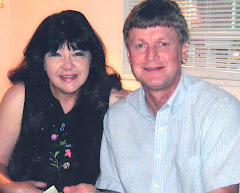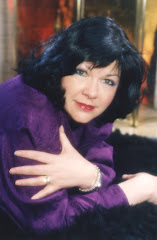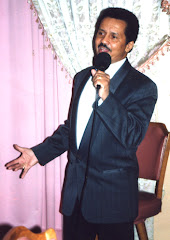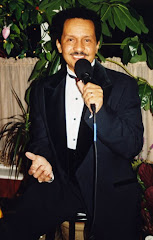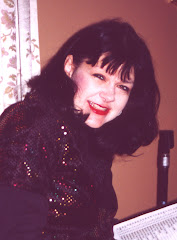Frank, my good friend who plays saxophone marvelously, called this week. He told me that he has been in touch with people he believes can help his music career. He is trying to think of ways to include me so that I can benefit from it, too.
I had an awful week, and was so out of energy and so despondent that his words just sounded to me like another potential disappointment. So, I began crying on the phone, which understandably shocked him.
But then, to cheer me, he gave me a compliment that was really from his heart, and while it was untrue, and meant nothing to me at the time, last night I began thinking about it while lying awake, staring at the ceiling fan. It may have been the nicest compliment I have ever received from anyone in my whole life, let alone from a middle-aged black man who has the experience and street cred to know whereof he speaks.
Frank told me that, even though I'm white, I GET black people.
Now, as I say, this is untrue. White people do not GET black people. It's physically impossible because of the continuity of being black. But it still warmed me immensely to hear him say that because it's what I have always wanted. I've always wanted to be a bridge between communities and to build understanding and intimacy. I think it's the only way to have a civilization.
I want to explain what I mean about the "continuity" of being black, as it was explained to me by a friend, Puddin' Pie Moss.
Pie told me that he is black continuously. There is no escaping it. When he walks down the street, people he sees a half a block away have formed an opinion of him, based on his skin, before he ever gets close enough to them to speak.
When he is in the black community surrounded by black people, there is a specific dynamic that whites can observe, but can't be a part of. And it's not always very good. This dynamic is both inclusive and demeaning. Some of these folks do, you know, call each other the "N" word, and it's accepted. But if I did it, it wouldn't be. That "N" word reinforces the sense of unity and community, but it also demeans and denegrates. It says, "Yeah, you're one of us, but as such, your're in the same sinking boat. It's us versus a juggernaut of white power."
So Pie, within the confines of his friends, family, and neighbors, is largely defined by something that is both strenthening and pejorative.
But, when Pie is in the white community, the dynamic changes in ways that are easier to predict, but sometimes very hard for whites to identify because it's a subtle dynamic. The little non-verbal messages that black folks get from whites all the time are often things whites don't even know they're saying or doing, but they come across loud and clear.
"You're probably a criminal, or at best, not someone I should trust." "You aren't as good as me." "I'll hire you if someone makes me, but you should view it as a gift." "You're gonna have to be twice as good to be regarded as half as valuable." "I'm afraid of you and what you may represent." "You and I have no common ground. None at all. We shall not talk because there's nothing to say."
Rick, a black man, once told me that at the hospital where we both worked, a place where he was as comfortable and relaxed as any place in his life, he stepped into an elevator one day. An elderly white woman in the elevator took one look at my friend's dark face, and clutched her purse tightly to her chest.
My friend felt like he'd been cold-cocked.
This assault certainly wasn't subtle to Rick. But it's pretty fair to assume that this frail little woman had no idea at all that she had hurt him.
Now, I'm a white person who has tried pretty hard for many years to understand how black people feel. The innate racism in this country is not that hard to document. Whoopi Goldberg does not have to scream at me on "The View" that racism is real. She's a black woman, albeit a wealthy one. I'm willing to take her word for it.
And I can also catch on that within the black community, there is another form of racism that suggests to young people that they will never be allowed to succeed in the white world, and if they do, it will be such a rare, miraculous thing that it will be tantamount to a Powerball win. "So, take our word for it. Limit your expectations, give the minimum effort, and ratchet back your personal goals, cause you aren't going anywhere."
If a young black man is convinced by his friends that the only way to get over in this life is to take short cuts that will borrow a lot of trouble for himself, that is destructive. But if he buys the party line, stays in school, gets the education, struggles to succeed and then goes off into a white-dominated world and learns to embrace the same hopelessness and inevitable failure there, that's just as destructive.
Which is worse? I don't know.
The only thing this young black man knows for an ironclad certainty is that he's black. And he always will be. He has the continuity.
White people have it another way. Ones like me who have been accused of being bleeding hearts can thrust our psyches into what it must be like to have these subtle, disheartening messages piled on top of our every-day struggles. We can tell ourselves, "Oh, my! How hurt and insulted would I be if a stranger clutched her purse to her chest when I got in the elevator."
But I'll never live it. Empathy and imagination nothwithstanding, I have no continuity.
We well-intentioned white people can try to walk in a black man's moccasins if we so choose, but afterwards, we can and will hide behind our white skin. We can stop being black with a toggle switch in our imagination. Even if we are white people who are poor and struggling, we don't have the continuity, the inescapability, of being black in culture that thrives on divisiveness. And without that, we can't really understand.
Saturday, August 16, 2008
Subscribe to:
Posts (Atom)


